| Strategy | Luck |
|---|---|
| Interaction | Components & Design |
| Complexity | Score |
It is the eighteenth century and the skies darken over England. That’s not a metaphor for anything, nor is it talking about the typical English weather. The Industrial Revolution has begun and coal smoke blackens the air and lungs of England.
The original Brass turned ten years old last year, but the game by Martin Wallace still holds a proud overall rank 24 on BoardGameGeek at the time of writing. Not bad in a time where new games are so numerous that many won’t even be remembered ten years from now.Two new editions by Roxley are a great opportunity for us to review this modern classic. Technically it’s Brass: Lancashire that is a new edition of the original Brass, Brass: Birmingham is more like a spin-off. However, the two games are so similar in rules and theme that we decided to put them in one review and highlight the differences.
Smoke over North England – The Rules of Brass: Lancashire
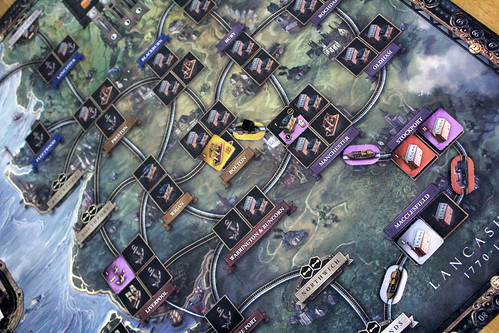
Brass: Lancashire is a game of economics and logistics. In the early days of the Industrial Revolution the players set out to build their own empire of factories and transport routes between them. Considering the strategic depth of the game its basic outline is remarkably simple.
A game consists of two eras, the Canal Era and the Rail Era. In each era you play through the same pile of cards until the draw pile and the players’ hands are empty. At the end of both eras you score points for your industries and your transport network. On a player’s turn they play two cards from their hand to trigger two actions. That’s it. How to use those actions to maximize your score, that’s where your head will start smoking.
Your most obvious move, and your most obvious route to score points, is to build industry. Interestingly, this action is the only one where it actually matters what the card you play shows. Cards show either a city and will allow you to build any sort of industry there, or they will show a type of industry that you may build in any city connected to your network.
Building industry doesn’t come free. Money you pay from your supply and that’s it. Coal and iron are way more interesting. Some of the industry you build are coal and iron mines. When you build them you put a number of black or orange cubes there. When you build something needing coal or iron for construction you have to get that stuff. Iron is needed in relatively small amounts, meaning transport is not a problem and you can consume those cubes from anywhere. Coal you need in bulk, and that means you can only take it trough proper transport roues (see below) and for reasons of efficiency you have to take it from the closest supplier.
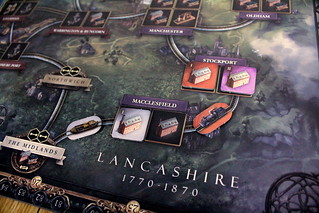
This bit about taking coal from the closest supplier is a crucial point of Brass because taking someone’s coal or iron cubes usually means you’re doing them a huge favor. When the last cube is gone from an industry tile that tile is flipped over, and only now it is worth victory points at the end of the era. A cheeky opponent may force you to use their coal instead of your own if they can guess what you’re planning.
Transportation if essential, that’s why your second option to act is to build canals or rails, depending on the era. For any card and some money you can build a single transportation link. In the rail era you can build two links at once by paying quite a bit more money. Most links allow canals or rails, but some can only be build in as canals or as rails and are unavailable in the other era. Transport links are necessary to expand your network and to get the coal where it’s needed, but they are also quite profitable. For every flipped industry tile on either end of the link, the link will score points. And it doesn’t even matter who the industry belongs to. Just keep in mind you’ll have to build many links twice: Canals are removed at the end of the Canal Era so you start the Rail Era on a blank slate, transportation-wise.
Coal and iron are not the only thing your industry produces, though. Cotton is a big deal as well, and since there are no cotton cubes there is another way to flip those cotton mill tiles. For an action and discarding any card you may sell cotton from your cotton mills and flip them over immediately. All you need is to have a connection from the mill to a port tile. If the port tile is not yet flipped you may sell there and flip the port tile as well, even if it belongs to another player. Alternatively you may sell at the Distant Market, but with each sale there the demand drops, until finally the market closes.
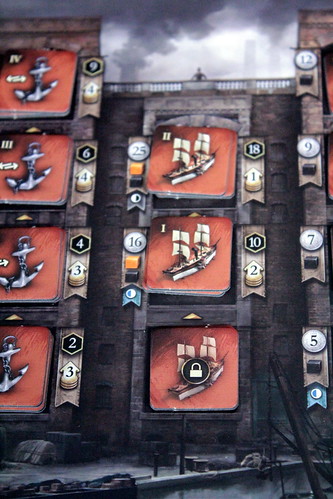
The next action is to develop your industry. All the kinds of industry come in different levels. You unlock higher levels by building the lower ones or by developing, meaning simply removing low level tiles from the game. Higher level industry tiles are more expensive to build, but also more profitable, so developing is an investment in the future. On top of that all level one industry tiles are removed from the board at the end of the Canal Era and you won’t be able to build that obsolete poppycock in the Rail Era.
And finally, as an action, you can take a loan: Take a load of cash, but drop your income to account for interest. Money in Brass is handled in a quick and simple way. There’s no need to count all your tiles on the board when time comes to collect income. Whenever you flip an industry tile you adjust your income marker, when you collect income you just look where that marker is and take a fistful of those nice, heavy, thick poker chips the deluxe edition uses for money. Or some retail paper, that works, too.
Money in Brass is also used to determine player order. You collect all the money you spend during your turn, and whoever spent the least will go first next round. Simple, but with deep, strategic impact. You want to go first next round? Sure, just don’t do anything expensive now. Such a simple decision, right?
Whatever happened to the Shire – Differences to older editions
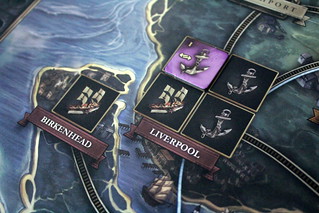
There’s really not much to say here, the rules are mostly the same from older editions of Brass to Brass: Lancashire. Some details have changed, and all for the better in my opinion. Liverpool and Birkenhead are now two entirely separate cities. Gone is that weird half link that let you build in one if you were connected to the other but did not let you transport coal. The other change concerns preparing the deck for the game. The old rules had you remove random cards to fit the deck size to your player count. The new rules remove specific cards for a more deterministic game. Finally, the rules now work for two to four players, you don’t need fan rules any more to play in two players.
Welcome to the Midlands – Brass: Birmingham
The basic rules are all the same between Brass: Lancashire and Brass: Birmingham. Beyond the basics, however, you find a slew of differences worth talking about. To start with, ports and shipyards are gone. If you look at Birmingham on a map this won’t require an explanation. Instead there are potteries, manufacturers of unspecified goods (we’ll call them mugs) and breweries.
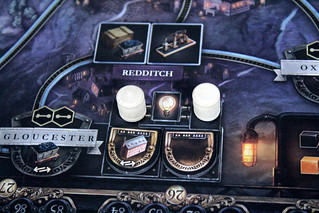
Mugs and potteries are similar to cotton mills: To flip them you take a sell action. You can even sell from different types of industry for one action. Beer, though. Beer is different. Since there are no port tiles to flip and no distant markets to saturate there had to be another limit to how much you can sell. This limit is beer.
Whenever you sell cotton, ugs, or pottery you now need to supply beer to do so. Breweries are similar to coal and iron mines. When you place a brewery you put a number of barrels on the tile that you then consume with sell actions. When you sell good the beer required can come from your own breweries, wherever they are, or from opponents’ breweries if they are connected to your network. A third option is to consume beer provided by the merchant you’re selling to. You even get a little bonus if you do that, a reward for selling early in an era.
What to do in Northern England on a Rainy Weekend – The Verdict
There’s no question that any edition of Brass is an excellent economic game. The flow is quite simple and well structured, but the number of options and their long term consequences make every decision from the first move on interesting and important. Nevertheless, Brass flows quickly thanks to only having two actions per turn. You’ll have to wait for other players, sure, but your downtime never reaches the point where you consider what you could play while you wait.
A big part of you staying engaged in the game while your opponents play is how important their actions are to you. Interaction was always what stood out to me about Brass. It’s not interaction as in negotiating and forming alliances, nor the kind of interaction you get from stock trading games. The term I’ve heard to describe it is aggressive cooperation, and I think it fits perfectly. See what no one else is building and make it your niche. Build those iron mines when no one else has them so it’s cheaper to use your iron than build their own mines. Make them offers they could refuse, but it’s simply cheaper for them to accept. This means that there is no winning strategy. Watch your opponents, react to them, squeeze out a few points more than they can manage. Reaction is key.
That was always true for the game now known as Brass: Lancashire, and the same is true for Brass: Birmingham. The two games are similar enough that you can learn the second game in five minutes. But they are also different enough that you’ll have to come up with new strategies. The change from ports and market saturation to breweries and beer to limit your sales is a pretty big deal.
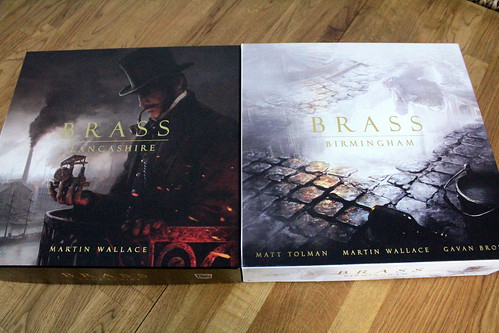
The big question is, of course: If I have one Brass game, do I need the other? I really want to say yes here, because both games are brilliant. In truth, though, the answer is: Only if you play a lot. If you play a Brass game once in a blue moon, then either game will keep you happily entertained for a long time. If you find yourself playing Brass weekly, then getting the other game is absolutely worth your while. More of the thing you enjoy, but different enough to keep you on your toes.
Finally, a word about the Roxley editions. Our review is based on the Deluxe editions from Kickstarter, and that poker chip style money is incredibly satisfying to handle. There are some other differences in components, but overall the quality of the retail version is great as well, and you get beautiful illustrations in both of them. It takes some doing to make a map style game board and city/industry cards look this good. The box illustrations both are some of the best I’ve seen, too. Personally, I prefer the Birmingham one, but feel free to leave a message and tell me how wrong I am.
This new edition of Brass is certainly a worthy new edition of a game that absolutely deserved a new edition.















